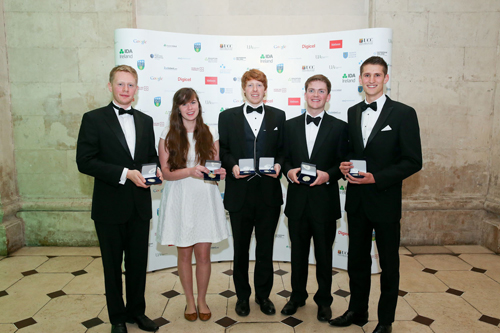Trinity Students Excel at 2013 International Undergraduate Awards
Posted on: 18 November 2013
Five Trinity College Dublin students received the Bram Stoker Gold Medal at the prestigious Undergraduate Awards (UA), the only pan-discipline international academic awards programme connecting the world’s top students across the sciences, humanities, business, and creative arts.
Trinity received the highest number of overall awards, with the University of Edinburgh and NUI Galway in second place, and students from Harvard and Princeton also being honoured across the 22 categories. This year a Trinity student, Shane McEntagart, also had the unique distinction of winning two national awards, in the Languages and Linguistics category, and also in the Mathematical and Physical Sciences category.
Congratulating the students on their success, the Senior Lecturer/Dean of Undergraduate Studies, Dr Patrick Geoghegan said: “This year the competition brought together some of the brightest undergraduate students from around the world. The extraordinary achievement of our students shows the quality of the Trinity Education in a global context, and is an indication of both the excellence of our students and the inspiring teaching of our staff. Trinity’s research-inspired curriculum helps students approach the challenges of the twenty-first century with an original and critical mind, and we are fortunate to have dedicated teachers who devote so much time and energy to helping their students reach their potential.”

Undergraduate Awards 2013 winners, from left, Jack Hogan (winner of Social Sciences category); Lara Cassidy (winner of Life Sciences); Shane McEntagart (winner of Languages & Linguistics and Mathematical & Physical Sciences categories); Ríán Derrig (Law); and Michael Gregg (Business & Economics)
This year there were 3,771 submissions to the Undergraduate Awards programme. In addition to the five overall winners in each of the 22 categories, Trinity secured the highest number of highly commended entrants in this year’s awards programme with 30 students receiving this distinction.
The Trinity overall category winners:
Michael Gregg, a final-year Business and Economics student won the Business and Economics category (national and overall) for his essay on ‘Was the crisis in finance caused by an over-reliance on elaborate quantitative modelling?’, which was described by the judging panel as ‘a succinct and informed discussion that merits the top prize’. During his time at Trinity Michael has led a team of equity analysts for Trinity’s Student Managed Fund, and has been included on the Dean of Student’s Roll of Honour.
Shane McEntagart graduated in 2013 with a TSM degree. He won the medal in the Languages and Linguistics category (national and overall) for his essay on ‘The reification of love in Alexander Kluge’s Ein Liebesversuch’ , which was described by the judging panel as ‘an excellent piece… crucially succeeds in conveying that understanding to the reader through a very lucid writing style’. In a competition first he also won the medal in the Mathematical and Physical Sciences category (national). During his time in Trinity he has received awards in recognition of his leadership from Scouting Ireland and was included on the Dean of Student’s Roll of Honour for his charitable work.
Ríán Derrig graduated in Law and Political Science from Trinity College Dublin in 2013. He won the award for the Law category (national and overall) for his essay on ‘Law’s normativity: legal validity and authoritative legitimacy’, which was described by the judging panel as ‘an exceptionally sophisticated paper dealing with among the deepest issues of modern legal philosophy… the intellectual ambition, and above all rigorous analysis of especially challenging and foundational concepts makes it an exceptional achievement’. During his time at Trinity he was a member of the Trinity moot court team that won the Council of Europe prize.
Lara Cassidy graduated in Human Genetics from Trinity College Dublin in 2013. She won the award for Life Sciences (national and overall) for her work on ‘Syncytin genes and the evolutionary invention of the mammalian placenta’, which was described by the judging panel as an essay that ‘could serve as the standard for everything that good scientific writing is about’ and ‘an outstanding piece of scientific writing that would be worthy of publication in any of the best scientific journals’. She is currently undertaking a PhD in Paeleogenomics in the Bradley Lab at the Smurfit Institute of Genetics at Trinity.
Jack Hogan is in the final year of his degree in Geography at Sociology. He won the award for Social Sciences (national and overall) for his essay on ‘Gap year saviours – an analysis of the role of race in development advertising’, which was described by the judging panel as ‘an excellent and thought-provoking piece that examines the intersection of race and ethnicity in the advertising of volunteer programmes in developing countries that target gap year students’. He studied on Erasmus at the University of Copenhagen, and is working on a final-year dissertation on the impact of social media outlets on the experiences of social exclusion of third-level students.
The students received their awards from Dr. Mae Jemison, the American scientist and retired NASA astronaut who became the first African-American woman in space, at the 2013 Undergraduate Awards Ceremony in Dublin’s City Hall on November 15th last.
The Undergraduate Awards programme was founded in 2008 by two Trinity graduates, Oisin Hanrahan and Paddy Cosgrove, as an initiative to inspire, support and celebrate high potential undergraduate students and their innovative research. Open to undergraduate students across Europe, North America, Asia and Australia, entrants are invited to submit essays/projects completed as part of their coursework and present fresh ideas and new arguments.
This year the gold medal was named after Bram Stoker (1847-1912), the Trinity-educated novelist and short story writer who created the iconic character of Dracula. While a student at Trinity he excelled at various sports, and he remains the only Trinity student to have been head of both the College Historical Society and the University Philosophical Society.
